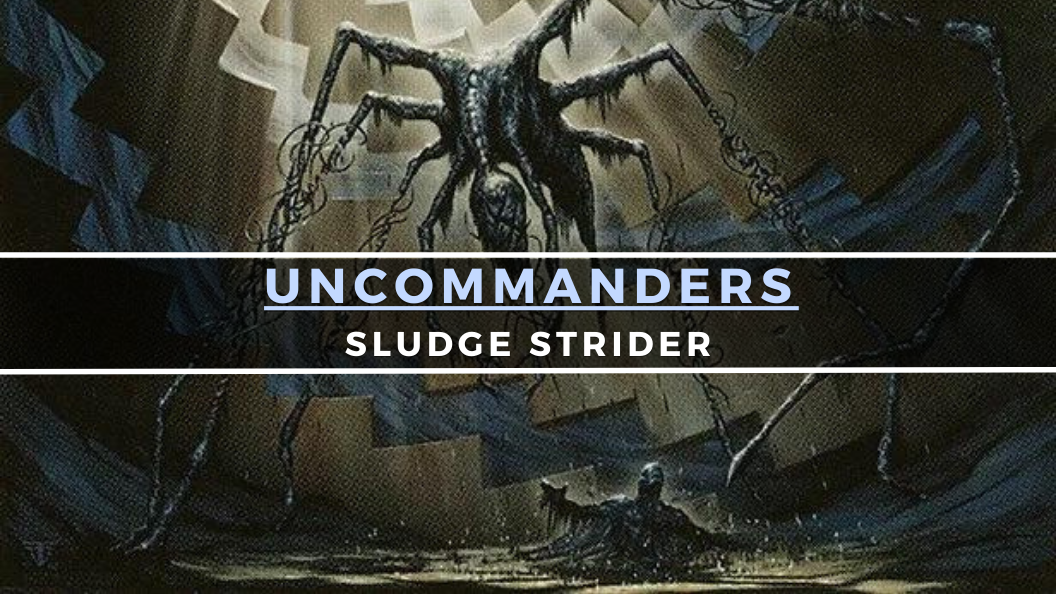Uncommanders: Sludge Siphon

Sludge Strider: Turning Waste into Drain Since the Sundering
Welcome to the second installment of Uncommanders, where we build decks out of nothing but commons to comply with the rules of Pauper EDH. With a lot of thought and effort, we can come up with some extremely cheap decks that rival the power of standard Commander cards. Let's see what we've got today!
I've got a long list of wacky commanders that I want to build, and at the top of my Pauper list is Sludge Strider. I'm not sure what it's supposed to be, thematically, but for us it's a machine that processes waste and turns it into life drain. There are a few downsides, most notably the fact that you have to pay one for it to trigger, but the fact that it activates whenever an artifact enters or leaves the battlefield means we can drown our opponents in constant pings. It's like extort, but for everything we do. Is it worse than Agent of the Iron Throne and any partner? Probably. But if we're not taking a terrible card and trying to power it up, we're not playing EDH. Now, let's see what we need.
Random Trash
Okay, we don't really want to have a bunch of total junk. We're looking for cards that come in for very little mana that can then sacrifice themselves. If they gain us some value in that process, that's even better. The entire Spellbomb Cycle is perfect, with every card costing one and putting itself into the graveyard with a relevant effect. Expedition Map and Wayfarer's Bauble get us some ramp, Dispeller and Executioner's Capsules provide a bit of extra removal, and Welding Jar can save our commander. In addition to the zero-cost Jar, we're also running Tormod's Crypt just for the free trigger, although that graveyard hate may come in handy.
Assembly-Line Workers:
To help out our Sludge Strider with the backbreaking task of recycling Esper's garbage, there are a few assistants in our deck. Cards like Marauding Blight-Priest, Epicure of Blood, and Disciple of the Vault will double our life drain, while Leonin Elder will double our life gain, keeping us above our opponents. Myr Retriever and Workshop Assistant can be used as blockers while recurring previous value, and of course, we also have all the Myr we can get our hands on, producing more mana to feed to the Strider.
Essentials
No deck will be able to function without removal, ramp, and card draw. Luckily, my favorite thing about Pauper is showing people how much of the staples they play are just commons. For our mana base, we're just using the signets and a few cards that produce Treasure. For our card draw, Read the Bones and Sign in Blood, classic black staples, are both Pauper-legal, and we'll have no trouble filling up the affinity for Thoughtcast. Of course, Village Rites and all its variants make it easy to get death triggers while filling up our hand. Then, to get problems off the board, Feed the Swarm and Claim the Precious are simple answers.
Now that we've got our deck, how does it do?
Testing!
So... it's not great. And to be honest, I knew it wasn't going to be when I built the deck. Firstly, in Pauper, we're somewhat limited in our means of increasing Sludge Strider's damage output. Marauding Blight-Priest does wonders, but it's not everything. The problem worsens when you realize that Sludge Strider drains one target, not each opponent. That's one-hundred and twenty triggers to get off. (Or 90, if you're actually playing pEDH.) Either way, you have a lot of work to do. To be fair, the deck is very consistent: almost every turn, you're triggering the Strider a few times. The card draw and control package is excellent. The issue is that our commander is too slow. It doesn't even fly below the radar, like I want most slow decks to do. Pinging for one multiple times a turn doesn't exactly earn the table's favor.
The thing is, this deck really wants the color red. Firstly, you gain loads of Reckless Fireweaver effects, ramping up your pings at a rapid pace. Even more important is the access to Treasure generation. Treasure is the best thing for this deck: each Treasure pays for its own leaves-the-battlefield trigger. But in our colors, there's a dearth of Treasure production. For reference, there are twenty-two red Pauper-legal cards that create Treasures. That's almost twice as many as the second-best, black. While I hate to say that one deck can't be made as good as another, I have to admit this deck is somewhat limited.
In Conclusion
Occasionally, something I do just doesn't work out. This deck is an example of a failed experiment. I don't think it's a terrible deck, it's just not what I wanted it to be. However, even though it kinda sucks, and I'm disappointed, it's not the end of the world. I'll make another deck.
Meanwhile, this was a fun experiment, and I didn't come out of it empty-handed. In fact, I found a few cards that'll be put to use elsewhere. There's the entire Spellbomb cycle, for one. Those cards are just packed with value. Every one of them has a desirable effect. Pendrell Flux is another hidden gem. No matter what, your opponents are in a poor position. Either they say goodbye to whatever creature you've enchanted, or they get taxed for the rest of the game. Usually, giving your opponents choices is a bad idea, but here, they're screwed either way.
Regardless of whether this deck is good, I'm better off now than I was before. Maybe we should keep this attitude with all the mistakes we make in life. What's an MTG mistake you've made that you learned something from?